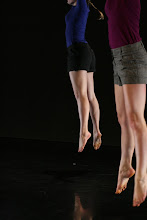Today I watched a documentary abou the Paris Opera Ballet. One of the opening shots is of the outside of the Opera house. It is an immense building of dark, sooty looking stone, etched with carvings and gilded embellishments. As the camera zoomed toward the main entrance and then began a tour through the equally impressive rehearsal studios and theater spaces my eyes started to tear, and I felt the telltale onset of emotion as my sinuses began to swell. Here, in this beautiful monument, were not bank managers or bureaucrats, but dancers, choreographers, and yes, even audiences.
I was overcome both by the beauty of dancing in such a place and by the seemingly ordinary nature of that very action to the busy inhabitants of the opera house.
And so I sat mesmerized for about an hour and a half by Nils Tavernier's 2001 debut Etoiles: Dancers of the Paris Opera Ballet I didn't feel that stab of envy that usually accompanies interviews with great ballerinas. Actually I felt like I could have been sitting right next to them through the intimate filming of their rehearsals, classes, and backstage lives. Most striking was perhaps the never ending poise of the dancers as they faced questions like "Do you think it will be hard for you when you a forced to stop dancing?", "will you ever have children?", "what is your rank in the company?" and on and on.
Some recalled their training at the Paris Opera Ballet school with fondness, saying that the criticism made them stronger, that they loved the challenge of it all. Others admitted to the great psychological pain that the constant competition and disparaging remarks from teachers caused them. They admit to the loneliness of their art, and the hunger to chase after it.
Tavernier gracefully weaves observational footage with black and white still, with interviews where he asks questions with a childlike innocence that belies the interviewers perceptiveness. He painstakingly documents the daily trials of a dancer, as well as the extreme athleticism and versatility of an Etoile by covering reperatory from the most classical (La Sylphide) to the edge of contemporary ballet today (Jiri Kylian).
Many may feel that this film lacks a strong enough message or plot, but for any devote of dance or ballet, this film will feel like a window into the soul. The life of a dancer is a constantly shifting landscape, and the real story is in their passion to get up every morning and confront that landscape one again.
06 September 2009
Subscribe to:
Post Comments (Atom)

No comments:
Post a Comment